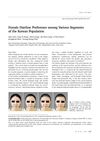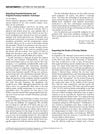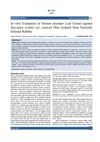 1 citations,
December 2014 in “Klinik Psikofarmakoloji Bülteni-Bulletin of Clinical Psychopharmacology”
1 citations,
December 2014 in “Klinik Psikofarmakoloji Bülteni-Bulletin of Clinical Psychopharmacology” Adding aripiprazole to the treatment improved hair-pulling symptoms in a teenager.
 1 citations,
January 2014 in “Annals of Dermatology”
1 citations,
January 2014 in “Annals of Dermatology” Korean people prefer M-shaped hairlines and lower foreheads, with no major differences across various demographics.
 1 citations,
January 2014 in “Side effects of drugs annual”
1 citations,
January 2014 in “Side effects of drugs annual” Antihelminthic drugs treat worm infections but face challenges like low treatment coverage and potential drug resistance, with various side effects reported for different drugs.
 1 citations,
January 2013 in “Elsevier eBooks”
1 citations,
January 2013 in “Elsevier eBooks” The document reviews various hair and nail disorders, their causes, and treatments, emphasizing the need for proper diagnosis and the link between nail changes and systemic diseases.
 1 citations,
March 2011 in “Infertility”
1 citations,
March 2011 in “Infertility” Hormone imbalances from the pituitary, thyroid, and adrenal glands can cause infertility, but treating these disorders can improve fertility.
 1 citations,
March 2011 in “Informa Healthcare eBooks”
1 citations,
March 2011 in “Informa Healthcare eBooks” Isotretinoin is a preferred treatment for severe acne, often leading to long-term improvement, but requires careful monitoring due to potential side effects.
 1 citations,
January 2006 in “Elsevier eBooks”
1 citations,
January 2006 in “Elsevier eBooks” The conclusion is that different types of hair loss in dogs and cats can be cosmetic or serious, and affected animals should not be bred.
 1 citations,
June 2001 in “Annals of Internal Medicine”
1 citations,
June 2001 in “Annals of Internal Medicine” The conclusion is that maintaining blinding in clinical trials is crucial for reliable results.
 1 citations,
June 2001 in “Annals of Internal Medicine”
1 citations,
June 2001 in “Annals of Internal Medicine” Troglitazone increases subcutaneous fat in lipodystrophy patients.
 1 citations,
June 2001 in “Annals of Internal Medicine”
1 citations,
June 2001 in “Annals of Internal Medicine” The document concludes that there is no credible evidence that distant healing works, and it should not be further studied in medical literature.
 1 citations,
December 1999 in “Dermatologic Surgery”
1 citations,
December 1999 in “Dermatologic Surgery” Propofol-ketamine and propofol-fentanyl are effective and safe for cosmetic surgery sedation.
 January 2025 in “Frontiers in Immunology”
January 2025 in “Frontiers in Immunology” IVIG therapy significantly improved symptoms in a patient with APS-2 and SPS.

Stopping finasteride and closing PFO can help prevent strokes in young adults.

Toxoplasma gondii infection may increase testosterone levels in males.
 March 2024 in “Deleted Journal”
March 2024 in “Deleted Journal” Bariatric surgery improves health but often causes hair loss and vitamin deficiency.
 January 2024 in “Indian Journal of Animal Research”
January 2024 in “Indian Journal of Animal Research” Nerium oleander leaf extract effectively kills scabies mites in rabbits.

Parry Romberg syndrome requires awareness and teamwork in primary care for proper diagnosis and management.
 June 2023 in “International journal of biology, pharmacy and allied sciences”
June 2023 in “International journal of biology, pharmacy and allied sciences” New medications are improving depression treatment, emphasizing accurate diagnosis and chronic care.

There are many treatments for common hair loss, but more trials are needed to decide which are best.
 January 2023 in “International journal of homoeopathic sciences”
January 2023 in “International journal of homoeopathic sciences” Homeopathy helped a 30-year-old man regrow his hair.
 January 2023 in “Revista Paulista de Pediatria”
January 2023 in “Revista Paulista de Pediatria” A Brazilian male with IFAP syndrome has a unique genetic variant causing his condition.
 January 2023 in “International Journal of Zoology and Animal Biology”
January 2023 in “International Journal of Zoology and Animal Biology” Canine hypothyroidism can be linked to diabetes, requiring thorough testing for proper diagnosis.

Social media data can help track and predict COVID-19 symptoms and trends.

An infant with a zinc deficiency skin disorder improved with zinc treatment.

Icosapent ethyl may help treat long-lasting symptoms after COVID-19.

Isotretinoin may cause temporary, reversible facial hair growth in some women.

The document concludes that the development of certain tumors is influenced by genetic background and that a specific gene modification can lead to tumor regression and reduced growth.
 January 2022 in “Acta dermatovenerologica Alpina, Pannonica et Adriatica (Tiskana izd.)”
January 2022 in “Acta dermatovenerologica Alpina, Pannonica et Adriatica (Tiskana izd.)” Uncombable hair syndrome causes frizzy hair and can affect the nervous system, eyes, and ears, often co-occurring with other hair, skin, nail, and teeth conditions, and is linked to three specific gene mutations.
 June 2021 in “bioRxiv (Cold Spring Harbor Laboratory)”
June 2021 in “bioRxiv (Cold Spring Harbor Laboratory)” Gene therapy in mice increased lifespan and improved health without causing cancer.
 March 2021 in “Indian Journal of Case Reports”
March 2021 in “Indian Journal of Case Reports” A young woman with late-stage Vogt-Koyanagi-Harada disease was successfully treated at a hospital.






























